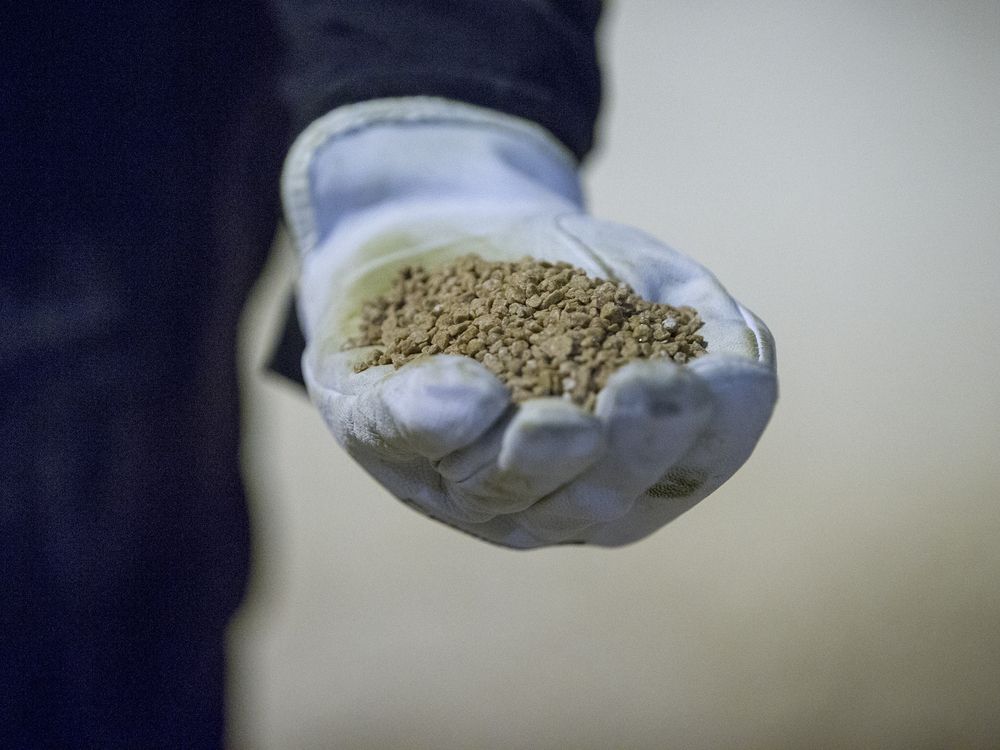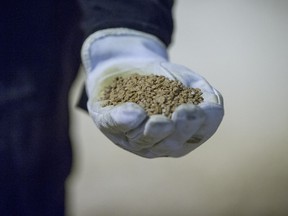Ottawa to give mining giant BHP up to $100 million to cut emissions at Jansen potash project

‘Not only is it going to be the largest potash mine in the world, but it is going to be the greenest’

Article content
Canada’s Industry Minister François-Philippe Champagne on Monday announced plans to spend as much as $100 million to help BHP, the world’s largest miner, reduce emissions at its planned potash mine in Saskatchewan.
Advertisement 2
Story continues below
Article content
The announcement came at a press conference in Jansen, Saskatchewan — east of Saskatoon — where Champagne was joined by BHP’s chief executive Mike Henry, who flew in from Australia.
Champagne released few details, saying his government had reached “an agreement in principle” with BHP during the past few days that would see it invest up to $100 million, so BHP can invest in “electric” equipment and other ways to reduce emissions from its planned Jansen potash mine.
“Not only is it going to be the largest potash mine in the world, but it is going to be the greenest,” Champagne said at the press conference.
The funding ties into the Federal Liberals’ strategy to reach net zero carbon emissions by 2050 by helping aid industry decarbonisation. Last summer, the federal government made a string of “strategic investments” from its net-zero accelerator fund including $420 million for Algoma Steel Inc. in Sault St. Marie, Ont., and $400 million for ArcelorMittal DoFasco GP in Hamilton, Ont., to retrofit coal-fired steel-making operations to electric arc furnaces that vastly reduce carbon emissions.
Advertisement 3
Story continues below
Article content
The recent federal budget allocates $3.8 billion in cash and tax credits, between now and 2030, to develop a supply chain of critical minerals and Champagne said that the proposed funding for BHP fits into this plan.
Last August, after years of debate and incremental investment that reached into the billions of dollars, BHP announced that it would move forward with Jansen potash mine, which is estimated to cost $7 billion.
It was not expected to begin production until 2027, but Henry said at the press conference Monday the company was looking to accelerate the production date by one year to 2026.
“It’s a clear vote of confidence in Canada as a top global investment destination,” Champagne said, adding, “and I would say (to) Mike (Henry) we are ready for more.”
Advertisement 4
Story continues below
Article content
At the press conference, Henry described potash “as a commodity of the future,” and has previously told the Financial Post his company is looking to reduce the carbon emissions profile of its portfolio. In 2021, it agreed to sell its petroleum business.
“With potash, we’re opening up a whole new growth front for the company,” said Henry.
BHP has said its Jansen potash mine could produce 4.3 to 4.5 million tonnes per year in its first stage. The mine has four potential expansion stages, and Henry said the company was also looking to accelerate production from stage two if market conditions look favourable.
-

World’s biggest fertilizer producer warns of severe food crisis on horizon because of Russia, Ukraine war
-

Nutrien to hike potash output 40% in sign it sees long conflict in Ukraine
-

BHP’s unsuccessful nickel bid ‘tip of iceberg’ for growth ambitions, top executive says
-

Nutrien sees disruption to global food supply chain extending ‘well beyond this year’
Advertisement 5
Story continues below
Article content
To put that in context, Canada produced around 22 million tonnes of potash in 2021 — more than any other country. Potash is a fertilizer that helps boost crop yields and strengthen plants.
Russia and Belarus are the second- and third-largest producers in the world, and both have been disrupted by sanctions and by Russia’s invasion of Ukraine.
Last week, Saskatoon-based Nutrien Inc. announced plans to boost its production from about 15 million tonnes this year, to 20 million tonnes by 2025. Its interim chief executive, Ken Seitz, told the Financial Post he expects Russia and Belarus will produce anywhere from 6 to 10 million tonnes less than expected, out of a total market estimated at 70 million tonnes.
“Demand is growing and Canada is stepping up to do its part … after the violent, inhumane and illegal aggression of Russia against the people of Ukraine,” Champagne said at the conference.
• Email: gfriedman@postmedia.com | Twitter: GabeFriedz
Advertisement
Story continues below









